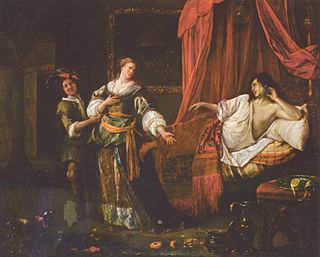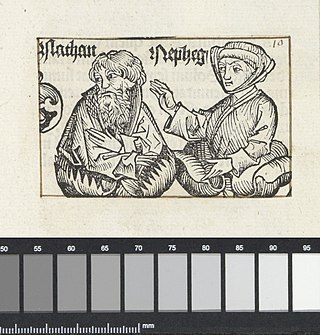Related Research Articles

Abiathar, in the Hebrew Bible, is a son of Ahimelech or Ahijah, High Priest at Nob, the fourth in descent from Eli and the last of Eli's House to be a High Priest.

Abigail was an Israelite woman in the Hebrew Bible married to Nabal; she married the future King David after Nabal's death. Abigail was David's third wife, after Ahinoam and Saul's daughter, Michal, whom Saul later married to Palti, son of Laish, when David went into hiding.

Amnon was, in the Hebrew Bible, the oldest son of King David and his second wife, Ahinoam of Jezreel. He was born in Hebron during his father's reign in Judah. He was the heir apparent to the throne of Israel until he was assassinated by his half-brother Absalom to avenge the rape of Absalom's sister Tamar.

The Book of Samuel is a book in the Hebrew Bible, found as two books in the Old Testament. The book is part of the Deuteronomistic history, a series of books that constitute a theological history of the Israelites and that aim to explain God's law for Israel under the guidance of the prophets.

David was a king of ancient Israel and Judah and the third king of the United Monarchy, according to the Hebrew Bible and Old Testament.

In the Hebrew Bible, Abishag was a beautiful young woman of Shunem chosen to be a helper and servant to King David in his old age. Among Abishag's duties was to lie next to David and pass along her body heat and vigor because "they put covers on him, but he could not get warm".
According to 2 Samuel, Adonijah was the fourth son of King David. His mother was Haggith as recorded in the book of 2 Samuel 3:4. Adonijah was born at Hebron during the long conflict between David and the House of Saul. In 1 Kings, he briefly proclaimed himself king of Israel during the terminal illness of his father David, before peacefully ceding the throne to his brother Solomon.
Ahinoam is a Hebrew name literally meaning brother of pleasantness, or my brother is pleasant, thus meaning pleasant.

Joab the son of Zeruiah, was the nephew of King David and the commander of his army, according to the Hebrew Bible.
Narratives featuring incest can be found in the Hebrew Bible, which contains mentions of various types of sexual relationships. It also lays out rules and regulations with regard to prohibited degree of kinship. These prohibitions are found predominantly in Leviticus 18:7–18 and 20:11–21, but also in Deuteronomy.

Zadok, also spelled Ṣadok, Ṣadoc, Zadoq, Tzadok or Tsadoq, was a Kohen (priest), biblically recorded to be a descendant of Eleazar the son of Aaron. He was the High Priest of Israel during the reigns of David and Solomon as kings of Israel. He aided King David during the revolt of his son Absalom, was subsequently instrumental in bringing Solomon to the throne, and officiated at Solomon's coronation. After Solomon's building of the First Temple in Jerusalem, Zadok was the first High Priest to serve there.

Nathan was the youngest son among four or five children born to King David and Bathsheba in Jerusalem if names were written in order in the Bible. He was a younger brother of Shammuah and Shobab, and Solomon who was the second oldest child of Bathsheba. The first son died before he could be named.
Haggith is a biblical figure, one of the wives of David. Her name means "festive."

Tamar was an Israelite princess. Born to David and Maacah, who was from Geshur, she was the only full sibling of Absalom. She is described in the Hebrew Bible as being exceptionally beautiful, as is her brother. In the narrative of 2 Samuel 13, she is raped by her paternal half-brother Amnon before fleeing with torn robes to Absalom's house; David is angered by the incident, but does nothing, as Amnon is his heir apparent. Absalom, infuriated by the rape and David's inaction, keeps Tamar in his care and later assassinates Amnon to avenge her, subsequently fleeing to Geshur, which is ruled by his and Tamar's maternal grandfather Talmai. Three years later, he returns to Israel and leads an armed revolt against the House of David, but is killed by David's nephew and army commander Joab during the Battle of the Wood of Ephraim. Tamar is described as being left "a desolate women in her brother's house" and the sole guardian of her orphaned niece, who is also named Tamar.

The sons of King David are mentioned both as a group and individually several times in the biblical accounts of the reigns both of David and his successor Solomon.

1 Chronicles 3 is the third chapter of the Books of Chronicles in the Hebrew Bible or the First Book of Chronicles in the Old Testament of the Christian Bible. The book is compiled from older sources by an unknown person or group, designated by modern scholars as "the Chronicler", and had the final shape established in late fifth or 4th century BCE. This chapter contains the genealogy of unbroken Davidic line from the time of David to the post-exilic period, providing a possibility of the reinstatement of the Davidic monarchy in Jerusalem with its rightful heir, should circumstances allow. It is divided into three parts: (1) the sons of David ; (2) the kings in Jerusalem ; (3) the descendants during and after the exile period, verses 17–24. Together with chapters 2 and 4, it focuses on the descendants of Judah: chapter 2 deals with the tribes of Judah in general, chapter 3 lists the sons of David in particular and chapter 4 concerns the remaining families in the tribe of Judah and the tribe of Simeon. These chapters belong to the section focusing on the list of genealogies from Adam to the lists of the people returning from exile in Babylon.

2 Samuel 13 is the thirteenth chapter of the Second Book of Samuel in the Old Testament of the Christian Bible or the second part of Books of Samuel in the Hebrew Bible. According to Jewish tradition the book was attributed to the prophet Samuel, with additions by the prophets Gad and Nathan, but modern scholars view it as a composition of a number of independent texts of various ages from c. 630–540 BCE. This chapter contains the account of David's reign in Jerusalem. This is within a section comprising 2 Samuel 9–20 and continued to 1 Kings 1–2 which deal with the power struggles among David's sons to succeed David's throne until 'the kingdom was established in the hand of Solomon'.

1 Kings 1 is the first chapter of the Books of Kings in the Hebrew Bible or the First Book of Kings in the Old Testament of the Christian Bible. The book is a compilation of various annals recording the acts of the kings of Israel and Judah by a Deuteronomic compiler in the seventh century BCE, with a supplement added in the sixth century BCE. This chapter belongs to the section focusing on the reign of Solomon over the unified kingdom of Judah and Israel. The focus of this chapter is the reign of David and Solomon, the kings of Israel.

2 Samuel 3 is the third chapter of the Second Book of Samuel in the Old Testament of the Christian Bible or the second part of Books of Samuel in the Hebrew Bible. According to Jewish tradition the book was attributed to the prophet Samuel, with additions by the prophets Gad and Nathan, but modern scholars view it as a composition of a number of independent texts of various ages from c. 630–540 BCE. This chapter contains the account of David's reign in Hebron. This is within a section comprising 1 Samuel 16 to 2 Samuel 5 which records the rise of David as the king of Israel, and a section comprising 2 Samuel 2–8 which deals with the period when David set up his kingdom.

2 Samuel 14 is the fourteenth chapter of the Second Book of Samuel in the Old Testament of the Christian Bible or the second part of Books of Samuel in the Hebrew Bible. According to Jewish tradition the book was attributed to the prophet Samuel, with additions by the prophets Gad and Nathan, but modern scholars view it as a composition of a number of independent texts of various ages from c. 630–540 BCE. This chapter contains the account of David's reign in Jerusalem. This is within a section comprising 2 Samuel 9–20 and continued to 1 Kings 1–2 which deal with the power struggles among David's sons to succeed David's throne until 'the kingdom was established in the hand of Solomon'.
References
- ↑ David Mandel Who's Who in the Jewish Bible 2007- Page 74 "CHILEAB (Hebrew origin: Like the father) (2 Samuel 3:3) 10th century b.c.e. Chileab, born in Hebron, was King David's second son. His mother was Abigail, the widow of ... Bible does not mention him again. He was also called Daniel (1 Chronicles 3:1)."
- ↑ Warren W. Wiersbe The Wiersbe Bible Commentary: The Complete Old Testament 2007 Page 580 "2. It's likely that David's second son, Chileab (or Daniel), died young, for apart from the royal genealogy, he is not mentioned in the biblical account (1 Chron. 3:1)."
- ↑ Avner Falk A Psychoanalytic History of the Jews 1996 Page 120 "By both lists, Chileab (or Daniel) was the heir to the throne after the deaths of Amnon and Absalom."
- ↑ Hans Wilhelm Hertzberg - I & II Samuel: a commentary - Page 254 1964 "3.1 the name Daniel surprisingly takes the place of Chileab; the old translations offer further deviations (Daluyah? Dodiyah?)."
- ↑ Klein, Reuven Chaim (2018). "Identifying the Daniel character in Ezekiel" (PDF). Jewish Bible Quarterly. 46 (4): 231–240. doi:10.17613/5z2g-gj55.
- 1 2 "II Samuel 3:3". www.sefaria.org. Retrieved 2020-08-01.
- ↑ James Orange -Synoptica Hebraea: Anglo-Hebrew Bible expositor 1858 Page 32 "Chiliab, Kl-ab, perfection of, father, 2 Sam. iii."